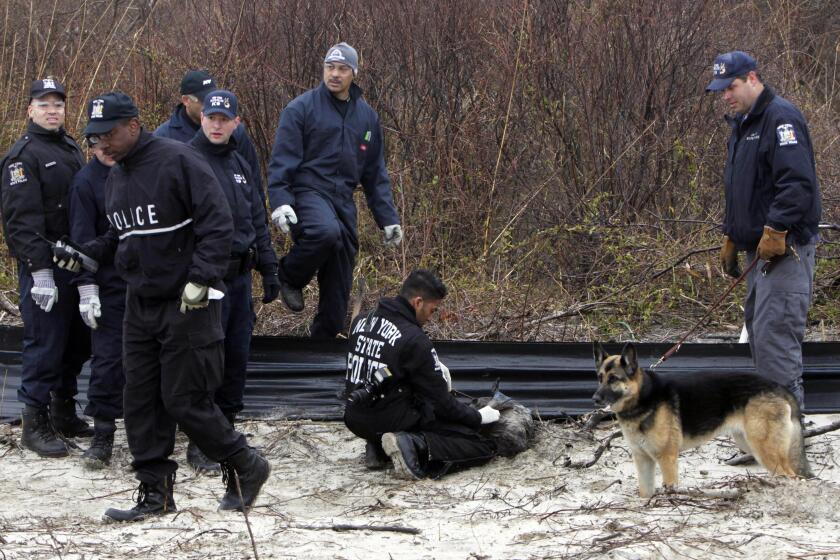After 27 years, authorities identify woman in string of Long Island killings

- Share via
HAUPPAUGE, N.Y. — A woman whose remains were among discoveries that became known as the Gilgo Beach killings has been identified after 27 years, authorities said Friday.
Known until now to the public only as “Jane Doe No. 7,” she was Karen Vergata, 34, Suffolk County Dist. Atty. Ray Tierney told a news conference.
Her family last heard from her on Valentine’s Day in 1996, when she called her father on his birthday, according to a 2017 court decision that declared her presumptively dead.
Friday’s development was part of a reinvestigation that, last month, spurred the first arrest in connection with the long-unsolved string of killings that emerged when remains of 10 people were found over a decade ago along a coastal parkway in Gilgo Beach, on Long Island in New York.
But it is unclear whether Vergata’s death might ever be tied to the ongoing case against Rex Heuermann, an architect who has been charged with three of the killings and named the prime suspect in a fourth. Tierney declined to comment on “what, if any, suspects we developed” in Vergata’s death.
A suspect has been taken into custody on Long Island in connection with long-unsolved killings known as the Gilgo Beach murders.
Some of Vergata’s remains were discovered in 1996 on Fire Island. More of her bones were found in 2011 near Gilgo Beach, more than 20 miles west of the original location.
Vergata lived in Manhattan, Tierney said. He said investigators believed she was working as an escort; most of the other victims in the Gilgo Beach killings also were sex workers.
No missing persons report was filed when Vergata disappeared, Tierney said. However, her father, Dominic Vergata, said in court papers that he hired an investigator, alerted law enforcement agencies and contacted her acquaintances to try to find her, according to the court decision that declared her legally dead. It was not clear when the father undertook those efforts. He died in December, according to an obituary.
A new investigative task force, formed last year to investigate the Gilgo Beach killings, developed a DNA profile of the woman whom investigators called Jane Doe No. 7, Tierney said. Then the FBI used genetic genealogy techniques to identify her tentatively as Karen Vergata and the task force obtained a relative’s DNA to cement the identification in October, he said.
“It’s important that we remember and honor not only Ms. Vergata but all the victims on Gilgo Beach,” the prosecutor said, adding that the investigation into all of their deaths continues. He declined to answer any questions at the news conference.
Families of several women who were slain and dumped along the coastline of New York’s Long Island are trying to find closure after an arrest is made.
Authorities have yet to identify some other victims, including a woman whom investigators nicknamed “Peaches,” after a tattoo on her body. Some of her remains were discovered stuffed inside a plastic tub in Hempstead Lake State Park in 1997; others turned up near Gilgo Beach in 2011, along with the remains of an unidentified toddler believed to be her daughter.
Tierney said authorities held off releasing Vergata’s name while contacting her relatives and furthering their investigation, which led last month to Heuermann’s arrest in the deaths of Melissa Barthelemy, Megan Waterman and Amber Lynn Costello. Prosecutors say they also are working to charge him with the death of a fourth woman, Maureen Brainard-Barnes, but they have not yet done so.
Heuermann has pleaded not guilty, and his lawyer says the 59-year-old denies killing anyone.
Authorities have said he is unlikely to be responsible for all the deaths.
Authorities zeroed in on him as a suspect in the killings of Barthelemy, Brainard-Barnes, Costello and Waterman when the task force ran an old tip about a Chevy Avalanche pickup truck through a vehicle records database.
The records search turned up an Avalanche belonging to Heuermann, who lived in a Long Island neighborhood police had been focusing on because of cellphone location data and call records, authorities said.
FBI makes a connection between long-haul truckers, serial killings
Detectives said they were later able to link Heuermann’s DNA to a hair found on a restraint used in one of the killings.
After his arrest, investigators spent nearly two weeks combing through his home, including digging up the yard, dismantling a porch and a greenhouse and removing many contents of the house for testing.
Earlier this week, prosecutors said they have begun providing Heuermann’s lawyer, Michael Brown, with reams of evidence including autopsy findings, DNA reports and crime scene photos.
The case first drew headlines in 2010, when police began searching for a missing woman named Shannan Gilbert near Gilgo Beach. Instead, they discovered 10 sets of remains of other people, including eight women, one man and the toddler.
Gilbert’s body was found in December 2011 in the marsh in the community of Oak Beach, about 3 miles east of where the other 10 sets of remains were discovered. Investigators have found she drowned accidentally; her relatives have long disputed that determination.
Peltz reported from New York. Associated Press researcher Jennifer Farrar in New York contributed to this report.
More to Read
Sign up for Essential California
The most important California stories and recommendations in your inbox every morning.
You may occasionally receive promotional content from the Los Angeles Times.












